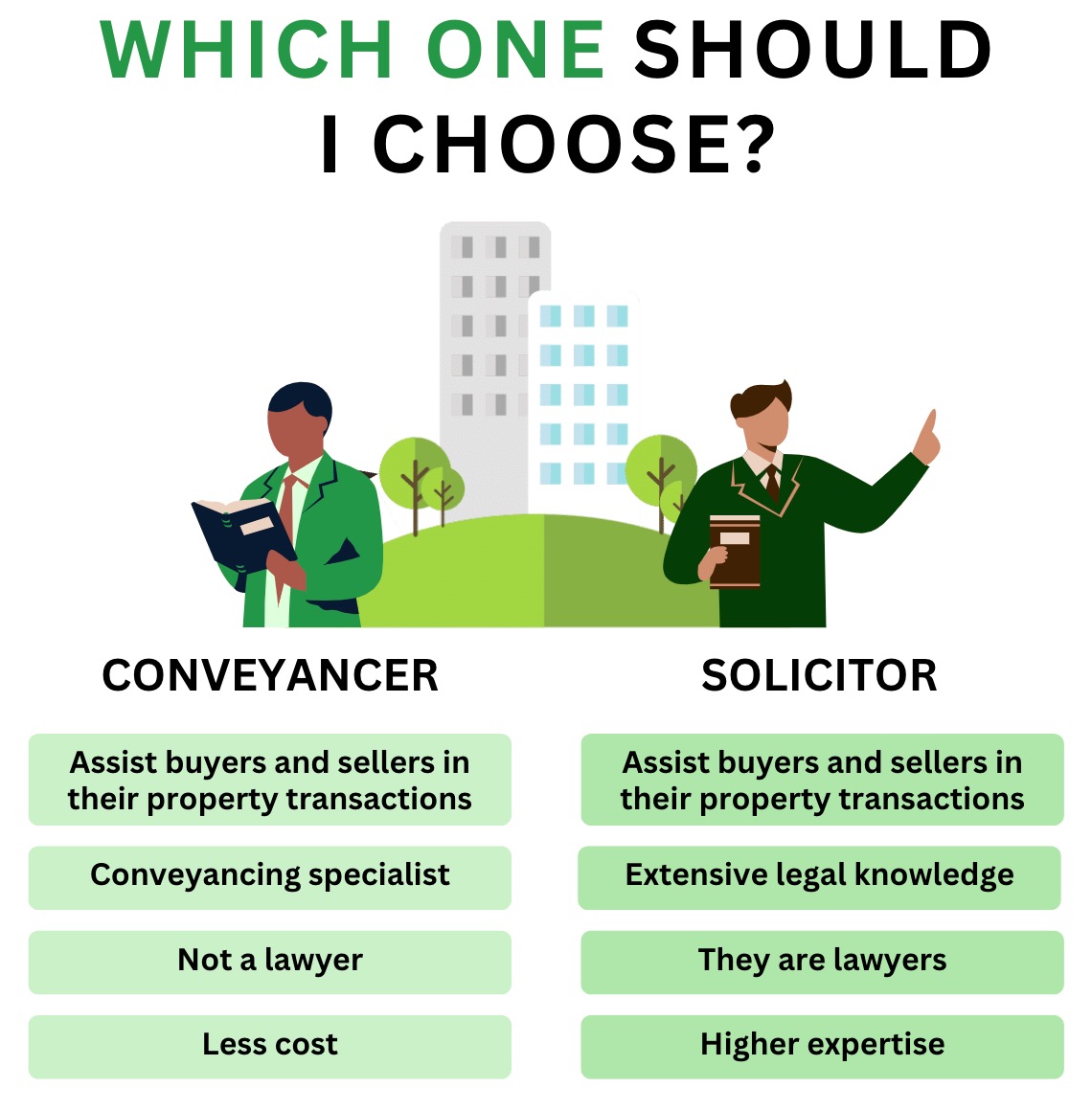The start of the conveyancing process signals the end of the homebuying journey. It’s an exciting time, and if all goes according to plan, you and your family will live happily in your brand-new property in a matter of weeks.
However, conveyancing is also one of the most important – and highest risk – phases of homebuying. It’s where all the paperwork – financial, legal, and administrative – is prepared, signed, sealed, and delivered.
One small hiccup can spell disaster, and that’s why every prospective homeowner needs a trusted team of experts in their corner, people who understand the buying process and know the nuances of property law. Enter: conveyancers and solicitors.
Conveyancers and solicitors are both qualified to handle the settlement process, and many buyers assume they do the same job. This is true to some extent, but solicitors tend to have the upper hand when it comes to education and legal expertise.
Before you settle the solicitor vs conveyancer debate, it’s critical to form a basic understanding of the disparity between the two. When you know the difference between conveyancer and solicitor, you can make an educated decision that safeguards your financial standing, ensures full transparency, and eliminates the risk of mistakes.
What is conveyancing?
Conveyancing is the process of transferring ownership of a property from one party to another. It requires all necessary documentation to be collected, collated, checked, and shared. Conveyancing is a legal process, and although you could opt for the DIY route, hiring a specialist is crucial to protecting your best interest.
What does a conveyancer do?
Conveyancer vs solicitor – which is better? To answer this question, you need a sound grasp of what each of these two professionals does, starting with conveyancers.
Leveraging a deep understanding of land law and division, taxation, contracts, property management, and property development, a conveyancer undertakes the complex task of transferring property ownership. This process might include the following:
- Communicating with involved parties, such as the vendor, purchaser, purchaser’s representative, and the lender
- Completing the forms and documents required for settlement
- Conducting searches for the property transaction
- Locating the Certificate of Title
- Obtaining the Statement of Adjustments for settlement
- Participating in every stage of the settlement process to ensure a seamless title transfer
- Preparing the Contract of Sale
- Preparing the Section 32 Vendor’s Statement
Conveyancers are qualified and licensed professionals, with licensing requirements varying from state to state. Generally, a conveyancer must undergo an approved VET qualification (for example, the Advanced Diploma of Conveyancing) or an accredited law degree (for example, a Bachelor of Law).
What does a solicitor do?
A solicitor is a legal practitioner who provides legal advice to clients across one or more fields of law, including property law and conveyancing, family law, immigration, and personal injury. In Australia, the term ‘solicitor’ can be used interchangeably with ‘lawyer’ – solicitors and lawyers are one and the same. However, unlike a barrister, a solicitor spends more time in the office than in the courtroom.
Solicitors are often the first point of contact for individuals and companies that require legal support or services. They draft court documents and letters on behalf of their clients, handle negotiations out of the courtroom, organise their clients’ legal files, and advise barristers.
Solicitors become qualified following a multi-step education and training process:
- Complete an approved undergraduate law degree.
- Those with an undergraduate degree in a field other than law can complete a graduate-entry Bachelor of Law or Master of Law.
- Undergo Practical Legal Training (PLT), which involves between 18 and 24 months of practice under supervision.
- Secure a practising certificate through the state’s admission authorities.
Is a solicitor the same as a lawyer?
Yes. A solicitor is the same as a lawyer. Solicitors undergo the same amount of education and supervised training as lawyers. In fact, many use the words ‘solicitor’ and ‘lawyer’ interchangeably.
It’s worth noting that conveyancers are not the same as lawyers. While some do, conveyancers are not required to have a university degree. Nor do they undertake mandatory supervised practice.
What’s the difference between a solicitor and a conveyancer?
Conveyancer vs solicitor – what is the difference? On the one hand, solicitors can perform the same tasks and duties as conveyancers. They can offer the same services and assist buyers and sellers in their property transactions. On the other hand, solicitors have more extensive legal knowledge thanks to their four-year degree and supervised training.
In other words, conveyancers only know conveyancing. They are specialists. Solicitors are often required to study property law at university and can select conveyancing as their specialisation, but they also have a robust understanding of many different fields of law.
Here’s another way to answer the conveyancer vs solicitor debate: solicitors are lawyers, and conveyancers are not. Therefore, conveyancers might not have the legal expertise needed to help navigate legal matters beyond the scope of a typical property transaction. For this reason, solicitors are better positioned to mitigate risk and ensure a smooth settlement within complex contexts.
Conveyancer vs solicitor: which is more expensive?
In most cases, a solicitor will charge more for their conveyancing services than a conveyancer. Why? Because they can offer advice and protection above and beyond conveyancers. Solicitors boast a higher level of expertise and seniority, so they are better equipped to handle unconventional or complex transactions.
However, Entry Conveyancing believes every buyer and seller should have access to the highest quality legal care and support – especially first-time buyers. That’s why we only employ qualified solicitors who specialise in conveyancing and offer their services at fixed rates starting at $550. That means no hidden fees or surprise charges.
The cost of conveyancing performed by a solicitor depends on several factors, such as the nature of the transaction, type of property, and location. If you would like a personalised quote, fill out the short form here.
Solicitor vs conveyancer: which is right for me?
So, you understand what solicitors and conveyancers do and what makes them distinct from one another. Now, it’s time to settle the solicitor vs conveyancer debate once and for all. Which is suitable for you and your property transaction?
While there is no one-size-fits-all answer, a solicitor is always a safer bet. This is because solicitors have more training and education, their legal knowledge is broader, and they are better equipped to help you navigate legal challenges should they arise.
In contrast, conveyancers have less training and are not trained or qualified to assist you beyond the scope of the actual conveyancing process. So, if a difficulty should rear its ugly head, your conveyancer may suggest you contact a solicitor.
Of course, you might be tempted to end the conveyancer vs solicitor debate and opt for a conveyancer based solely on price. The good news: you don’t need to risk your property transaction by hiring a conveyancer who isn’t a qualified solicitor. At Entry Conveyancing, our team members are all solicitors, and our prices are fixed and transparent. We don’t tack on additional charges so that you can proceed confidently.
How do I find a good solicitor or conveyancer?
The stakes are high when it comes to buying or selling property or transferring property ownership. The last thing you need is a financial penalty for failing to disclose information or a Contract of Sale that leaves you wishing you negotiated the terms. That’s why doing your research and reading up on solicitors and conveyancers is key to unlocking a smooth, seamless, and, most importantly, stress-free settlement. After all, buying or selling a home is supposed to be a time to celebrate.
So, how can you find a good solicitor or conveyancer?
First, decide which professional you’d like to hire. This will help you narrow down your search. Then, consider the rules in your state or territory. Conveyancing rules differ across Australia, and it’s crucial your solicitor or conveyancer is locally licensed.
Finally, contact several solicitors or conveyancers with proven track records and excellent reputations. How a company responds to customers’ enquiries speaks volumes about its commitment to service. If your messages are ignored, you know to take your business elsewhere. Online reviews are another valuable resource worth exploring.
Qualified solicitors dedicated to five-star service
Property is a financial investment, but it’s so much more than that. Homes are where families grow, and memories are made. They are places of warmth and comfort, self-expression, and enjoyment. They are the backdrops of our lives, and that’s why you need the very best support in your corner as you near the end of your property buying or selling journey.
As a team of qualified solicitors, we understand that every transaction is unique. Our depth of knowledge and commitment to customer care allows us to weather any storm that comes our way. Your best interest is our top priority.
With experts in every state and territory across Australia, Entry Conveyancing is ready to do the hard work for you, wherever you live. So start your journey today with a free, no-risk quote. Alternatively, get in touch on 1800 518 187 or info@entryconveyancing.com.au to speak with one of our team members. We are all too happy to answer your question and address your concerns.






